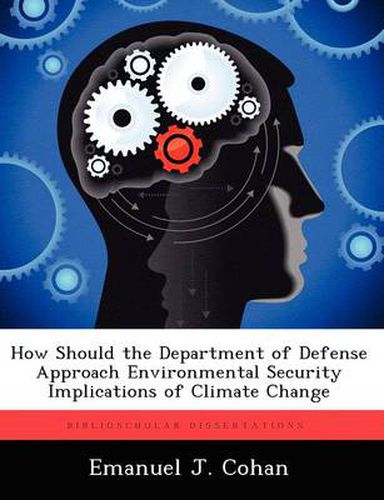Readings Newsletter
Become a Readings Member to make your shopping experience even easier.
Sign in or sign up for free!
You’re not far away from qualifying for FREE standard shipping within Australia
You’ve qualified for FREE standard shipping within Australia
The cart is loading…






This title is printed to order. This book may have been self-published. If so, we cannot guarantee the quality of the content. In the main most books will have gone through the editing process however some may not. We therefore suggest that you be aware of this before ordering this book. If in doubt check either the author or publisher’s details as we are unable to accept any returns unless they are faulty. Please contact us if you have any questions.
Environmental Security (ES) is a process for analyzing and responding to those environmental issues caused by anthropogenically driven environmental degradation. Climate change is a major ES threat having the potential to affect U.S. national security and thus has significant impact for the military national defense mission. This paper considers the most up-to-date climate change projections published by the IPCC, NASA, and the U.S. Global Change Program along with the latest national strategic guidance in order to determine actions required by the DoD. An overwhelming number of greenhouse models indicate considerable changes will affect U.S. national security during the mid 21st century. In addition, the study shows the DoD is currently at the onset of strategically organizing itself to analyze climate change impacts, provide combatant commanders with relevant mission preparedness information, and assess impacts to U.S. military installations of rising sea level/extreme weather events. Therefore, this study makes the following four recommendations: (1) ES must be a national security component, (2) DoD must establish an activity dedicated to develop ES related strategy, (3) Climate change data should be incorporated into a yearly Intelligence Environmental Estimate, (4) USJFCOM should take the lead in developing climate change related training scenarios.
$9.00 standard shipping within Australia
FREE standard shipping within Australia for orders over $100.00
Express & International shipping calculated at checkout
This title is printed to order. This book may have been self-published. If so, we cannot guarantee the quality of the content. In the main most books will have gone through the editing process however some may not. We therefore suggest that you be aware of this before ordering this book. If in doubt check either the author or publisher’s details as we are unable to accept any returns unless they are faulty. Please contact us if you have any questions.
Environmental Security (ES) is a process for analyzing and responding to those environmental issues caused by anthropogenically driven environmental degradation. Climate change is a major ES threat having the potential to affect U.S. national security and thus has significant impact for the military national defense mission. This paper considers the most up-to-date climate change projections published by the IPCC, NASA, and the U.S. Global Change Program along with the latest national strategic guidance in order to determine actions required by the DoD. An overwhelming number of greenhouse models indicate considerable changes will affect U.S. national security during the mid 21st century. In addition, the study shows the DoD is currently at the onset of strategically organizing itself to analyze climate change impacts, provide combatant commanders with relevant mission preparedness information, and assess impacts to U.S. military installations of rising sea level/extreme weather events. Therefore, this study makes the following four recommendations: (1) ES must be a national security component, (2) DoD must establish an activity dedicated to develop ES related strategy, (3) Climate change data should be incorporated into a yearly Intelligence Environmental Estimate, (4) USJFCOM should take the lead in developing climate change related training scenarios.